Olga Mosca - IV Circolo Didattico "Carolina Senatore" Scafati - Italy
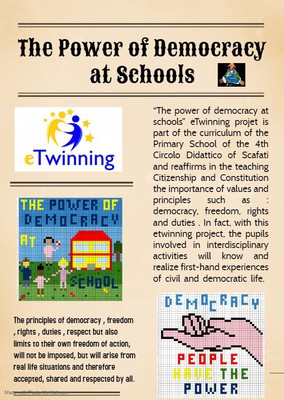
Elçin Ceyhan, Sehitler Secondary School, Manisa, Turkey
According to 2023 the Vision of Education.
With democracy and the economy an integrated understanding of education, Turkey's progress in every field start his movement and is the basic platform it will maintain.
In English Lessons:
- The words and sentences will be taught in English.
- Creating handmade designings will be integrated to the subjects.
- Teaching web2tools and the English words in web2tools will be taught.
- Reading and writing biogrophy of a famous people who shaped the democracy progressing.
- Teaching and listening lessons in a democratic atmosphere.
- Teaching and learning countries' nationalities, money, flags, capital cities and presidents of these countries, languages.
- Creating democratic school and classes.
- Raising awareness democratic participation among the students.
Fatma Kul, 50.Yil Secondary Scholl Salihli, Manisa, Turkey
Mostly I worked on this project with my 6th graders.In fact they have a unit named Democracy. This project would help my students see the way of democracy and important figures who shaped democracy in other countries. My main desire besides finding out more about educational systems in different countries and learning ways how to improve my teaching of democract at schools, was also to give my students a chance to find out that English Language is more than a school subject, it is means of communication. So I combined different types of pedagogical interdisciplinary methods.
It can be stated that most of the activities under this project are implemented during the school hours. Each of the topics included activities that are in every way related to the English language work program and teaching. The every content of the implemented games, which were proposed and shared by the other teachers included in project, can be freely adapted according to the needs of the group of students with whom I was working at the given time. As we have enough technological items in our classes,We could use web 2.0 tools mostly especially in our courses. For example while celebrating European Language day, we created a game via learningapps. We played it in the lesson and they went on playing it at homewith a great enthusiasm. Our students found the chance to read and write in English in twinspace. These activities were the most enjoyable ones for my studets as they found the chance of practising target language. We could implemented all the subjects to the curriculum easily. We just needed using tecnology and traditional methods.
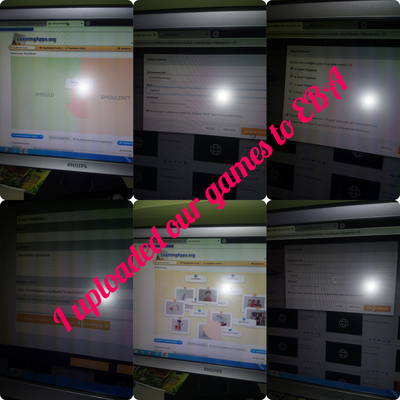
Necla YİĞİT, Ticaret ve Sanayi Odası Secondary School, Salihli, Manisa, Turkey
My students in the project are grade 6. In their coursebook, they have a unit called ''Democracy''.So we will integrate the project in the curriculum. During the project, they will learn the important values of democracy by the means of this project. They will do the activities willingly and consciously.They will elect the class president by voting.They will determine the class rules themselves.They will determine the best request box by voting.They will learn the improvement of democracy in our country (Turkey) and in the world. They will have information who contibuted to democracy all over the world. They will understand the importance of voting in every election. They will understand the meanings of ‘equality’, ‘liberty’, ’justice’ , ‘democracy’. They will have the chance of doing activities about Children's Rights, Human and Democacy Day, European Language Day, Contributors of Democracy...
Students will improve their English skills while they are doing the activities..They will introduce themselves,chat with partners,comment the activities,write sentences and paragraphes,shoot videos and make voki activities in English.They will communicate with the partners in online class in English.They will gain self-confidence.They will use web 2.0 tools and learn many computer programmes.
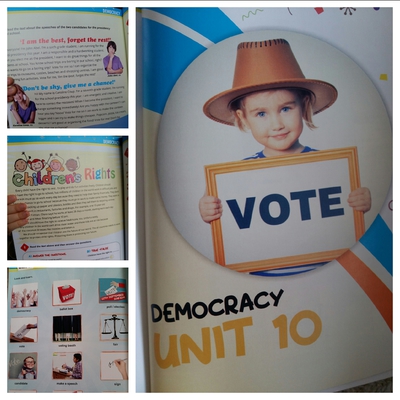
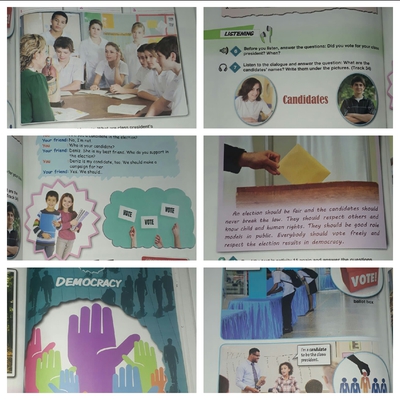
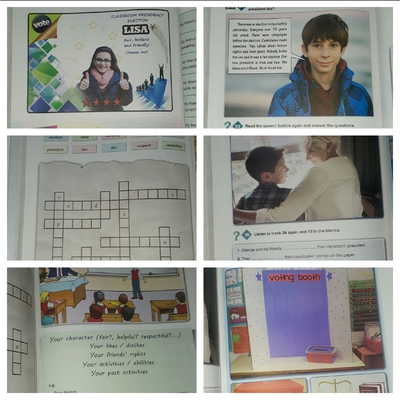
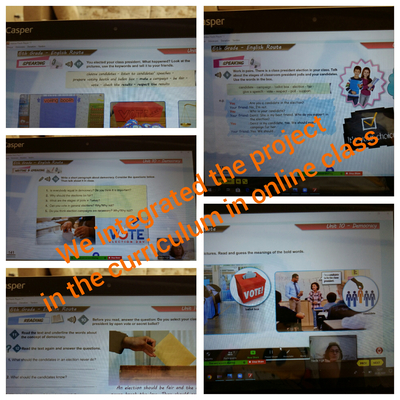
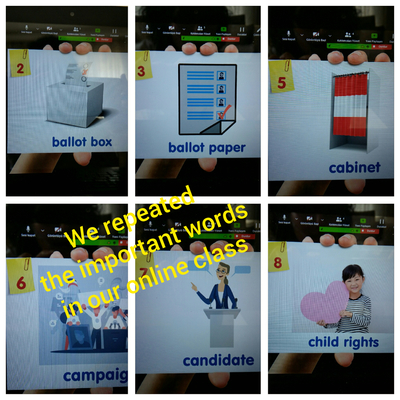
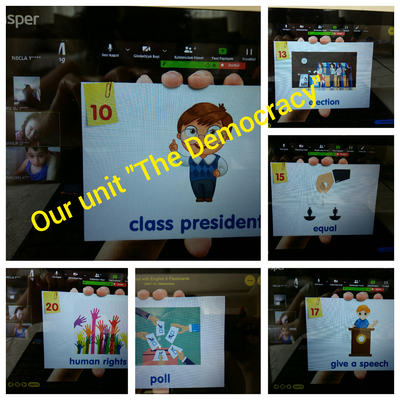
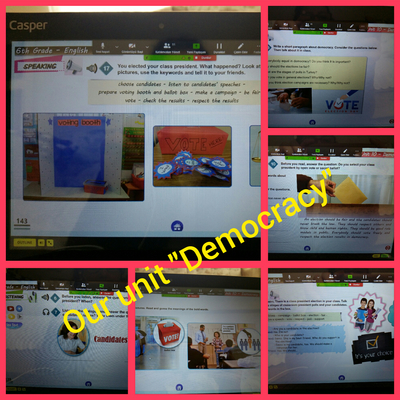
Serap Sonal, Şehitler Secondary School, Manisa, Turkey
Our project is provided to be included in the curriculum. Our project was included in my 5th, 6th, 7th and 8th grade social studies courses. Project and curriculum alignment is complete.Students; "Explains the emergence of democracy, stages of development.", "Analyzes the concepts of justice and equality.", "Analyzes the gains of the Republic.", "Explains the importance of democracy." They learned the gains like. The project was based on the school curriculum and the main part of the study was studied in the classroom. We also received support from our Technology Design and Visual Arts teacher in the English language. He also provided project support. At the Teachers Committee meeting held at the beginning of the year, it decided to support etwining projects. ETwinning school.
I worked with a group consisting of 6th grade and 8th grade arrangement. For the use of the project, I gave information about the subject, objectives, plan, use of Twinspace and internet security. My students got information about what to do at the beginning of the project. They were very excited. They worked with great motivation throughout the process. He lives in the project environment and learning was appropriate. It was done during school hours during the project work, but it is used for some tasks at home. The project was scientific with lessons such as Social Studies, Art, English, Music, Computer, Technology Design, Visual Arts. For the first time, my students learned to examine many web 2 tools. They learned how to create a video, make an avatar, prepare a date strip, create a game, prepare a presentation. While my students developed their digital and artistic competencies, they also gained language skills, personal autonomy and initiative use, usable awareness, communication with peers, using simple English words in live broadcast, courage and responsibility. They started speaking English without fear anymore. As a Social Studies Teacher, I started working on web 2 tools better. Also, my knowledge and skills in English have increased. I will continue to work towards becoming a teacher who renews himself, is open to development, and values communication.
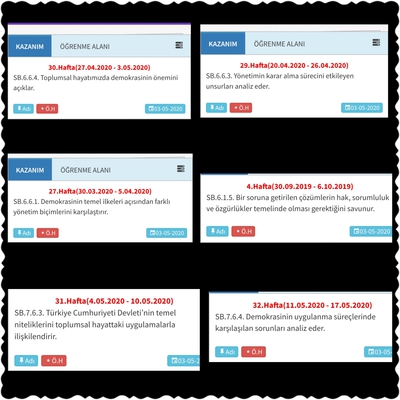
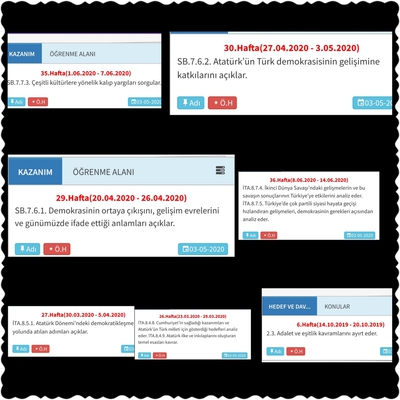
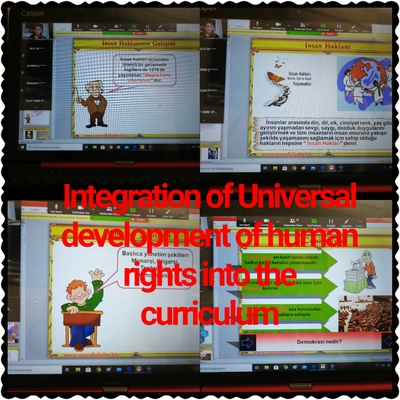
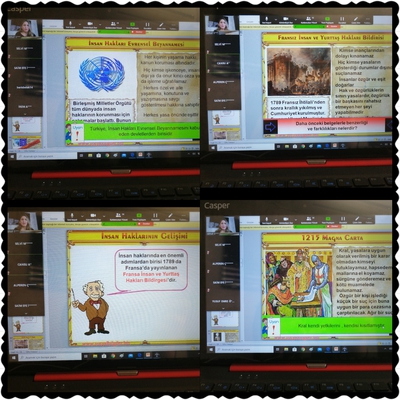
Manuel José Vázquez Feria, CEIP "Santa María Coronada", Villafranca de los Barros, España
I would like to begin with a brief contextualization of my center, as I see it as important to see why I am participating in the eTwinning Project: "The power of Democracy at Schools".
So, to say that I develop my teaching in a school located in a rural area. It belongs to one of the largest villages in the province of Badajoz, where, in addition to the present school, there are two more public schools, one subsidized and one private as far as Primary Education is concerned. With respect to Secondary Education, there are two centres, one public and one private.
A few years ago my school was much larger in terms of students, as it had two lines, but later it was reduced to one line, when a new one was created, both for Infant and Primary Education.
At the family level, comment that the socio-economic level is average, as is the cultural level, something very important to take into account when designing and proposing an educational project, in this case, as well as participating in such a project at the European level.
The help that some students can receive at home is not the same as that of others, for the reasons mentioned above (socio-cultural level of the parents). Besides this, not all of them have the same ICT possibility at home (which will be seen in the development of the project, since some will use computers, others tablets, and others the mobile phone). Therefore, I value very much the work done by my students and their parents. It has been wonderful the attitude of both areas, and the involvement in the project.
As for the students to whom the present project is addressed, we can say that they belong to the 6th grade of Primary Education. A group in which there is competitiveness, lack of respect among them, as well as to the teachers, and lack of education.
That is why I chose to participate with them in this fantastic eTwinning project that has been about democracy. I would miss the truth, if I did not say that I was very motivated with it, and very participatory.
As the coordinator of the centre in the project, and having carried out all the tasks and activities proposed, it is my duty to emphasize that I have had the confidence of the Management Team to carry out the project, as well as the help of the tutor Isabel Gómez Núñez, in the moments she has been able to, and the disposition of my colleagues who in one way or another have been flexible in the times. As far as the material is concerned, I have been able to count on all that we have needed from the centre.
The area that I teach is Catholic Religion, having linked the curriculum of the same with the project developed, because from the beginning I saw the need to participate in it given the characteristics of the student, in addition to the wealth that the area could bring to the project: "The power of democracy at schools", as far as the ethical aspect and formation in values: cultural and historical dimension based on cultural, historical and anthropological heritage; humanizing dimension constituting an effective contribution to the maturation of the integral personality of the students; ethical-moral dimension in which the concept of the person and his/her freedom is found; and finally, a scientific dimension being its contents knowledge with a foundation and a scientific methodology of its own, implemented with rigor and with the need to know other cultures, societies, ways of thinking, ways of positioning oneself in the world.
As for the contents of the area in relation to the project and the contents of the same, they are the following: curiosity in doing everything that surrounds the people; to initiate in the formulation of fundamental questions; dialogue with its companions in situations and behaviors where the human wealth is expressed; identification and valuation expressions that enrich and improve the person; identification of situations in which it recognizes the impossibility to be happy; construction of a comparative map between different actions; creation of compositions where the joy and the peace are expressed; interpretation of signs, in different cultures; recognition and acceptance of the necessity to be happy.
Finally, to say that if the students have enjoyed themselves, I have enjoyed myself more, seeing them like this. They have participated in all the activities, and their level of motivation has been very high. In addition, with the rules that we have been making throughout the project, their behavior has been changed.
It has been truly worth all the effort and work developed throughout the project, as well as having participated in it.
Juan Antonio Rincón Carballo, CEIP. Bilingual Ciudad de Mérida, Mérida (Spain)
The project has been integrated into the curriculum and the syllabus of the 6th grade of Primary Education, contributing to a better achievement of learning standards in the areas of Spanish language and literature, English, social sciences, values and plastic arts. The most important ones and their link to competences are specified below: Social and Civic Competences (CSCV), Linguistic Communication (CCL), Digital Competence (CD), Learning to Learn (ALC), and Cultural Awareness and Expressions (CEC).
- Works as a team valuing individual and collective effort to achieve the objectives. CSCV, CPAA.
- Expresses their feelings, needs and rights while respecting those of others in cooperative activities. CSCV, CCL, CPAA.
- Uses verbal communication in relation to non-verbal communication in oral presentations and debates. CCL, CSCV.
- Understands and appreciates cultural differences. CSCV, CEC.
- Argues the need for rules of coexistence in the different spaces of social interaction. CSCV, CCL.
- Participates in the elaboration of class rules. CSCV.
- Influences the need for the rules of their educational communities. CSCV, CPAA.
- Respects the rules of the school. LSCV.
- Knows and respects the rights and duties of the student. LSCV.
- Justifies their actions based on personal values such as dignity, freedom and equality. CSCV, CPAA.
- Argues for the universality of human rights. CSCV, CCL.
- Explains the importance of all people enjoying basic rights: health, welfare, food, clothing, housing and medical care. CESCR, CCL.
- Critically appraises the circumstances of people living in situations of deprivation of basic rights. CSCV, CCL, CPAA.
- Argues and exposes through images the importance of guaranteeing equal rights and non-discrimination on the basis of birth, race, sex, religion, opinion or any other personal or social condition or circumstance. CSCV, CCL, CEC.
- Explains the basic rights of the child. CSCV, CCL.
- Argues for the need to protect the basic rights of the child. CESCR, CCL.
- Arguably exposes the importance of valuing the equal rights of men and women. CSCV, CCL.
- Reflects on the rights and duties of the Spanish Constitution. CSCV.
- Expresses the characteristic notes of democratic coexistence. CSCV, CCL.
- Argues the importance of civic values in democratic society. CSCV, CCL.
- Makes an ethical use of technologies. CSCV, CD.
- Knows the safe use of technologies. CVS, CD.
Most of the work has been done during school hours with tasks and activities that have allowed students to develop the following skills: teamwork; respect for peers and teachers; communication in their own language and in a foreign language, English being our vehicle language; knowledge of and respect for other cultures; knowledge of school rules; participation in the community based on their rights and obligations.
The activities promoted the use of active methodologies such as project-based learning, Flipped Classroom and collaborative learning. They were defined based on the interests and motivations of our students, in order to guarantee their involvement. The students have become researchers in a learning journey shared with the teachers and in which they had to find information, filter it, process it and finally find an answer, usually creative, to face the challenges. Students became creators to generate some kind of final product that served both to respond to the challenges and to be disseminated as results of the project. The students took the role of protagonists from the beginning of the project.
MINKA MINCHEVA, SECONDARY SCHOOL HRISTO BOTEV, AYTOS, BULGARIA
My students are in 4th grade. In their coursebooks, they have some lessons related to ''Democracy'' and human rights. During the project, they will learn more about the important values of democracy and understand the meanings of ‘equality’, ‘liberty’, ’justice’, ‘democracy’. They will understand the importance of voting in every election, then they will vote for the class president and determine the class rules themselves. They will create a logo, a flag, and the best request box. They will learn about democracy in Bulgaria and in the world. They will do some activities about Children's Rights, Human and Democracy Day, European Language Day. So we will integrate the project into the curriculum. Students will improve their English skills while they are doing the activities. I hope they will become more self-confident and better European citizens.